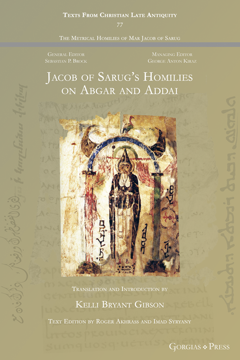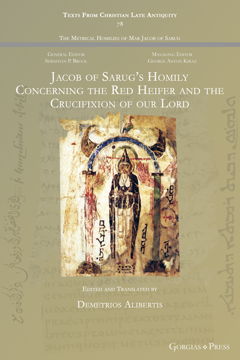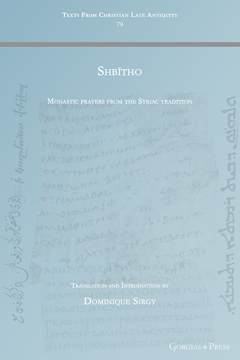Texts from Christian Late Antiquity
TeCLA (Texts from Christian Late Antiquity) is a series presenting ancient Christian texts both in their original languages and with accompanying contemporary English translations.
Jacob of Sarug’s Homilies on Abgar and Addai
Series: Texts from Christian Late Antiquity 77
ISBN: 978-1-4632-4469-9
Jacob of Sarug's homilies on King Abgar and the Apostle Addai, recounting the famous legend of Abgar of Edessa's conversion to Christianity.
$48.00 (USD)
Jacob of Sarug's Homily Concerning the Red Heifer and the Crucifixion of our Lord
Edited and Translated by Demetrios Alibertis
Series: Texts from Christian Late Antiquity 78
ISBN: 978-1-4632-4471-2
Jacob of Sarug's homily on the red heifer slaughter ritual in Numbers 19. For Jacob, the narrative is a prefigurement of Christ's death and its ability to restore and permanently purify all who enter the church through baptism.
$28.00 (USD)
Shbītho
Monastic prayers from the Syriac tradition
Translation and Introduction by Dominique Sirgy
Series: Texts from Christian Late Antiquity 79
ISBN: 978-1-4632-4475-0
The Shbītho d-Dayroye is a thirteenth-century anthology dedicated to the personal prayer of monks and nuns. The collection comprises the writings of great saints in the Syriac Orthodox tradition including Ephrem the Syrian, Abraham Qidun, John Chrysostom, Gregory of Nazianzus, Philoxenos, Basil the Great, and Isaac the Syrian. For each of the seven daily prayer times (morning, third hour, noon, ninth hour, evening, and night), there is a main prayer and a closing prayer. The present edition is the first translation to make the spiritual treasures of the original Syriac text available to readers in English.
$45.00 (USD)
Algorithmic Musings in Syriac
A Verse Poem on Computation Attributed to George of the Arabs
Edited and Translated by George Anton Kiraz
Series: Texts from Christian Late Antiquity 80
ISBN: 978-1-4632-4705-8
An edition of George of the Arab's homily on the Chronicon - on the reckoning of the year and the computation of the dates of feasts such as Christmas, Epiphany, and Easter.
$65.00 (USD) $52.00 (USD)
The Life of Sallara and his Mother Elishbah
East Syrian Christianity in Northern Mesopotamia from Late Antiquity to Early Islam
Series: Texts from Christian Late Antiquity 81
ISBN: 978-1-4632-4802-4
The first ever edition and translation of a biography of Sallara and his mother Elishbah, exploring both its local context – their asceticism and deeds in North Mesopotamia in the early 7th century – and the geopolitical events underway in the Middle East: war between Persia and Byzantium, and the rise of Islam in the region.
$114.95 (USD) $91.96 (USD)
Jacob of Sarug's Homily on the Entrance of Our Lord into Sheol
Series: Texts from Christian Late Antiquity 82
ISBN: 978-1-4632-4815-4
Recognized as a saint by both Chalcedonian and non-Chalcedonian Christians alike, Jacob of Sarug (d. 521) produced many narrative poems that have rarely been translated into English. Of his reported 760 metrical homilies, only about half survive. In this homily, On the Entrance of Our Lord into Sheol, Jacob tells with great power the invincibility of Sheol and how Christ gave His life to enter into Sheol like any other dead human so that He might conquer it.
$34.95 (USD) $27.96 (USD)






